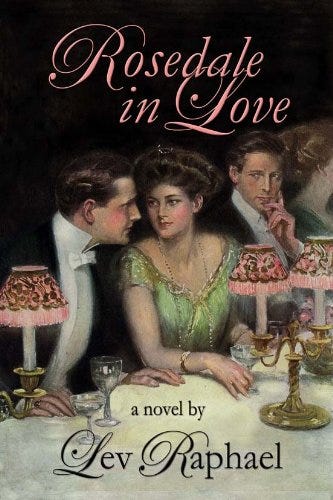Singing about marriage, two of Steven Sondheim’s characters in A Little Night Music condemn it for inflicting so much pain: “Every day a little death….every day a little sting.”
I felt just a bit like that in college, not because I was married, but because I was an English major. Time after time, I’d find a book I was reading and enjoying stung me because of an anti-Semitic portrait. There was Meyer Wolfsheim in The Great Gatsby, a Jewish antiques dealer in The Golden Bowl, and many more, too many to remember, but I met them at every turn in English and American books.
I understood that the authors were products of their society and a western culture that was ingrained with Jew-hatred, but it still pushed me out of the book the way a plot implausibility can make you lose faith in a movie. I don’t remember ever not finishing a novel that had a Jewish stereotype or slur, but I’d continue reading under something of a cloud.
Perhaps most disturbing of all for me was Edith Wharton’s The House of Mirth. I had first read her Pulitzer-prize winner The Age of Innocence and fallen in love, so I worked my way devotedly through her oeuvre in paperback. The House of Mirth was my favorite then and still is now. It’s a stunning book about the vanity of human wishes and the damage a superficial culture can inflict on those who won’t play by its rules—especially women’. Reading it for the first time in my senior year at Fordham, I was in awe: Wharton displayed an uncanny understanding of the power of shame to control behavior and crush hope. The novel was so beautifully written, so witty and sharp-edged, such an indictment of Gilded Age New York.
And very unpleasant to read–as a Jew. Every time the Jewish financier Simon Rosedale appeared in the book, I winced. He was showy, loud, vulgar, spoke bad English, and came off as a buffoon when he wasn’t insidious. Gentiles loved his money but rightly despised him, and his eye was always on the main chance.
Wharton actually pays special attention to his eyes the first time he appears, telling us he had “small sidelong eyes which gave him the air of appraising people as if they were bric-a-brac.” How ironic that Wharton’s contempt for Jews is projected onto him, turning him into someone for whom others are merely items to assess and purchase.
Simon Rosedale does show a less mercenary side, but it’s always connected to his fierce drive to get ahead by any means necessary. In the same way that assertive women today are seen by some people as “bitches,” Rosedale wanting success the way any other American might is condemned as vulgar and almost disgusting.
I hadn’t written much fiction of my own at the time, but in the following years, Jewish themes would predominate. I often found myself returning to writers who inspired me in college, writers like Henry James and Lawrence Durrell who were hardly philo-Semitic, and yes, Edith Wharton. The sting became duller each time, but it never entirely went away.
And then a few years ago, perhaps because I’d been reading Rosencrantz and Guildenstern again, an idea hit me. What if I did a Stoppard? What if I told Edith Wharton’s story in The House of Mirth from Rosedale’s perspective. What if I made him a person, in other words, and not a stereotype?
Rosedale in Love was born, and it bore me along with it on massive amounts of reading about The Gilded Age and turn-of-the-century New York, all of it deepening my appreciation of what Wharton had accomplished in the rest of her novel. And helping me let go of my regrets for the ways in which Wharton had lost the chance to make Simon Rosedale a real human being.
I was actually grateful to Wharton in a whole new way because she left me a whole book to write. A book in which Rosedale is a real person, not a caricature, a man with a family, a past, complex ambitions and far more humanity than Wharton gave him.
Rosedale in Love is available as an e-book or audiobook at Amazon. I will discuss the book and Wharton on a live stream tonight at 8pm after the 7pm debut of a song cycle by Emily King based on The House of Mirth. You can watch for free on both PasticheNYC YouTube or The Mount.






Sorry, subscribers, I sent this out a day late. I guess that classifies as a "calendar malfunction."
The lively post-premiere discussion about Wharton, The House of Mirth, and antisemitism is available here: https://youtu.be/7Mz6rM4jGT4
Here's the comment I wanted to post on the website after watching the discussion. But the website kept saying it failed. I tried everything: subscribing to the site, etc. Nothing helped. But I wanted to comment about how and what I thought of the talkback.
A fascinating discussion of the anti-Semitic elements in the work(s) of Edith Wharton and Henry James with revelatory comments by author Lev Raphael concerning his work and research and what led to the way he addresses those elements in several of his works. The discussion between Raphael and Moore also focuses on other aspects of Wharton's "The House of Mirth" that provide a greater understanding of Wharton's characterizations and psychology. And the whole discussion of "offensive" language and other trigger-warning topics is so current. What is most encouraging is how Raphael, the son of Holocaust survivors, explains how he has dealt with the anti-Semitism in the works of these writers whom he obviously holds in high esteem. Instead of condemning, vilifying, and censoring those authors, he has taken one of Wharton's characters, for example, Rosedale, and made him into a truly interesting character in his own right.👍